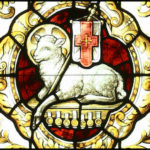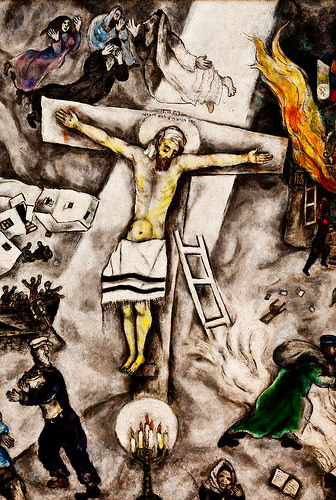We run our website the way we wished the whole internet worked: we provide high quality original content with no ads. We are funded solely by your direct support. Please consider supporting this project.
The Cross Above All Else
The way to know what a person or people group really believes is not to ask them but to watch them. Christians frequently say, “It’s all about Jesus,” but our actions betray us. Judging by the amount of time, energy, and emotion that many put into fighting a multitude of battles, ranging from the defense of the literalness and inerrancy of the Bible to war against gay marriage or universal health care, one easily gets the impression that Christianity is about a lot of different, equally important, things.
This unfortunately sends the message to the broader culture that becoming a follower of Jesus requires a person to embrace all of this. …
Strip away all the clutter, and what is left is simply the cross, where God reveals his true character and invites us to be transformed into his likeness through the power of his love. We trust that our fallen and self-oriented character will be transformed into God’s cruciform character. That is the kingdom, pure and simple.
The central significance of the cross is reflected in the fact that the sign of our covenant relationship with Christ is communion. When we look to the cross, we see the heavenly bridegroom wooing us, as his prospective spouse, by opening up his heart and revealing his true character. On the cross we see the heavenly bridegroom demonstrating his perfect love for his prospective bride—all of humanity—even while she had assumed the posture of an enemy toward him (Rom. 5:10). On the cross we see the heavenly bridegroom paying the required dowry to acquire his bride and to free us from our self-inflicted bondage to sin and to the powers of darkness. And on the cross we see the heavenly bridegroom imploring every human being to accept his marriage proposal and to become his bride who is making “herself ready” for his return, when the wedding supper of the lamb will be celebrated and she shall begin her eternal reign with him (Rev 19:7-9).
We say “yes” to this proposal when we exercise faith, which is why Paul says we are saved and reconciled to God through faith (e.g. Rom. 3:22018; Eph 2:8). Faith involves trusting God to be faithful in his relationship with us as well as pledging ourselves to be faithful in our relationship with God. And the cross defines what that covenantal faithfulness looks like for both God and us. By taking the bread and the cup in fellowship with others, therefore, we are reminded of the love and faithfulness God demonstrated and pledged toward us on the cross, and we are reminded of our call to imitate the love and faithfulness to God and our neighbor that was modeled for us on the cross.
One of the most remarkable expressions of the all-encompassing nature of the cross is reflected in an incidental, but extremely important, comment that Paul made in the First Letter to the Corinthians. He noted that when he brought “the testimony of God” to Corinth, he hadn’t come “with eloquence of human wisdom.” He instead “resolved to know nothing … except Jesus Christ and him crucified” (1 Cor. 2:1-2). …
Everything we are to trust God for is found in the cross. We are not involved in a contract that would require us, or even just allow us, to comb the Bible to latch onto this or that particular passage as a kind of insurance policy that God will come through for us. We are rather in a covenant in which it is not particular things we trust God for; our trust is rather in God himself. … We trust God to be who he reveals himself to be on the cross and trust that his moment-by-moment attitude toward us is what he reveals it to be on the cross.
This excerpt is from Benefit of the Doubt, pages 231-234.
Category: General
Tags: Benefit of the Doubt, Communion, Cruciform Theology, Faith, Jesus
Related Reading

Do You Have Enough Faith?
What does it actually mean to have faith? This is a topic I address at length in Benefit of the Doubt, but this post provides a very basic answer to this question. To appropriately understand the New Testament’s teaching on faith, we need to understand faith within the context of our marriage-like covenant with God…

Crucifixion of the Warrior God Update
Well, I’m happy to announce that Crucifixion of the Warrior God is now available for pre-order on Amazon! Like many of you, I found that the clearer I got about the non-violent, self-sacrificial, enemy-embracing love of God revealed in Christ, the more disturbed I became over those portraits of God in the Old Testament that…

Jesus, the Light that Blesses
God spoke a promise to Abraham in Genesis 12 that his descendants would be a great nation and that all of the nations would be blessed through him. In this sermon clip, Greg discusses how Jesus became the new Israel that would bring a blessing to all people. You can find the full sermon as well…

A Brief Theology of Faith
It is often argued that Hebrews 11:1 provides us with a clear definition of faith. The NIV translates it as, “Now faith is confidence in what we hope for and assurance about what we do not see.” Most of the times when we use different translations of the Bible, the differences between them are about…

How The Imperfections of Scripture Reveal God Perfectly
In my previous blog I discussed one important implication of a cruciform (“cross-centered”) approach to biblical inspiration. On the cross, I noted, God revealed his perfection by identifying with human imperfection. Jesus in some sense became our sin and our curse. In this light, I argued, why should anyone find it surprising, let alone disturbing,…

The Destiny of God’s People
Jesus represents the realization of God’s glorious dream for humanity. In Christ, we see what we who are in Christ are destined to be. As a stick placed in a river is destined to be carried to whatever body of water the river runs to, so all who have allowed themselves to be drawn by…

